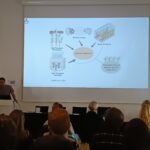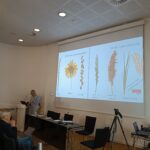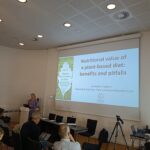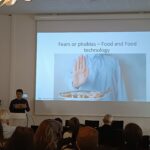What to eat in times of crisis? This was the theme that sheltered PlantLink’s celebration of this year’s Fascination of Plants Day. The event was hosted on the 9th of May in Lund, and we were happy to see a full room as well as many active participants online eager to hear the five invited panellists. All the speakers began with a brief presentation of their perspectives on the subject, which was followed by a lively discussion excellently moderated by science journalist Peter Sylwan. The theme was examined from various perspectives, including plant breeding, the role of perennials, the impact of diet on human health, and consumer behaviour. Panellists’ presentations can be downloaded below.
Here is what the experts said!
Aakash Chawade (SLU) “Plant breeding for improving food security”
Aakash began by providing an overview of past food crises, expanding on the causes and potential solutions. Finally, Aakash proposed that we can eat whatever we want if we shift our strategy from crisis-based to risk-based and make nutritious food affordable for everyone.
Take-home message:
“To prepare for a food crisis, we need to focus on self-sufficiency in food production, reducing wastage, and promoting sustainable agriculture practices. Plant breeding is vital for developing climate-adapted crop varieties and mitigating the impact of climate change on agriculture.”
Lennart Olsson (LUCSUS) “Is there a perennial future of agriculture?”
Lennart took us into a time capsule looking back from the year 2075 to see what happened to humanity and especially to agriculture in our time. In his perennial future vision, Lennart emphasised the advantages of perennial crops over annuals, discussed pesticide and seed industry reductions, and crop domestication towards the future of perennial grains.
Take-home message:
“The dependence on annual crops for our food supply is the root cause of many of the environmental, social, and economic problems of agriculture. The greatest promise for improving all unsustainable dimensions of annual grain agriculture are cropping systems which are dominated by perennial grains cultivated in mixtures – perennial polycultures. Research has shown that it is possible to develop such perennial grain crops and cropping systems, but plant breeding and plant science must increase rapidly to take advantage of the potential.”
Lieselotte Cloetens (LU) “Nutritional value of a plant-based diet: benefits and pitfalls”
Lieselotte commented on how the global food systems are unable to meet the nutritional needs of a growing population. A plant-based diet can help with food sustainability and is beneficial to human health. However, there is a risk of overconsumption of ultra-processed foods and further research on the protein content of meat alternatives is needed.
Take-home message:
“Following a whole food plant-based diet has important benefits for both health and the environment! Be careful when choosing plant-based alternatives to meat and dairy products. They are often ultra-processed, i.e. including many industrial additives to improve sensorial properties. Eat varied and choose wise!”
Jun Niimi (RISE) “Consumer’s voice – Challenges and barriers facing new products”
Jun pointed out that taste is the driving force behind consumer decisions, and that sustainability and nutritional content is not the main deciding factor. When introducing innovations in the food market, it is important to consider fears, societal dogmas, and expectations. Consumers’ faith in new products should be gradually built and not shattered.
Take-home message:
“Taste is an important factor to consider when introducing new products/newly developed and bred plants. But other factors are important to consider, such as barriers other than taste that consumers experience when approaching new foods. The key is for all of us researchers from multiple disciplines to collaborate together, to help provide information for the food industry to then develop products so that society can not only be resilient in times of crises, but also be provided with food options that are sustainable, healthy, and palatable.”
- Aakash Chawade: Plant breeding for improving food security
- Lennart Olsson: Is there a perennial future of agriculture?
- Perennial wheat demonstration
- Lieselotte Cloetens: Nutritional value of a plant-based diet: benefits and pitfalls
- Jun Niimi: Consumer’s voice – Challenges and barriers facing new products
- Peter Sylwan, Jun Niimi, Aakash Chawade, Lieselotte Cloetens and Lennart Olsson (from left to right)
Following the experts’ introduction, an engaging discussion began between the panellists and both physical and online participants. It was a whirlwind of facts, arguments and opinions, with topics changing at a rapid pace.
Discussion glimpses and food for thought
- Is it difficult to change our consumers’ habits? We are predisposed to crave sugar and fat. Our preferences are ingrained in both our culture and our DNA. How could society be educated to change these habits?
- Researchers are responsible for making food available to anyone. If scientists give consumers options, their habits will eventually change.
- 58,000 farmers for 10,000,000 consumers in Sweden.
- Food production vs. food waste: about 70% of potatoes, 50% of strawberries, and 30% of carrots are wasted. Research is aimed at increasing yield, even a 1% increase is celebrated, but what about food waste? “Breeding for beauty” – consumers choose better-looking products.
- High-tech food, such as cellular meat, is an excellent idea, but how will the market react? Fear of disgust can prevent people from trying the product.
- Reducing N-fertilizers is necessary, but using no fertiliser at all is a completely different challenge.
- Can we solve the food crisis in time?
- First, we must identify the problem to be solved, and then we must choose the appropriate technology.
- To overcome the food crisis, all cross-cutting scientific disciplines should work together. One specific measure could be to remove CRISPR-Cas9 from the blacklist in the EU.
- More preventative measures in nutrition are required, as well as possibly a sugar tax.
- Swedish policy, particularly in the Skåne region, should include investments in drought-tolerant crops and new technology. Sweden has always excelled in innovative technologies; let’s return to the roots!








